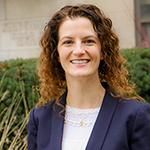Beating Burnout
A recent workshop equipped MLDS students with knowledge and personalized prevention tools to avoid the dangers of burnout.
A September 2023 study in the American Journal of Physiology reported that up to 50 percent of graduate students had symptoms of depression, anxiety, or burnout.
Northwestern Engineering's Master of Science in Machine Learning and Data Science (MLDS) program (formerly the MSiA program) is committed to helping students prevent burnout from happening — or identifying ways to navigate burnout should it occur.
The MLDS program recently welcomed two psychologists from Northwestern's Counseling and Psychological Services (CAPS), who hosted the first of two Burnout Balm workshops for students in the class of 2023. The second session, for the class of 2024, is scheduled for mid-January.
That the workshops are available free to MLDS students is a sign the program’s leadership is focused on the physical, emotional, and mental well-being of those it is educating, the workshop’s creators said.

Collins and her CAPS colleague Dr. Manisha Rustagi hosted the first workshop, which was divided into three sections.
The first reviewed the signs and causes of burnout. The second looked at strategies to cope with burnout. During the first two parts, students used what they learned to start a personalized burnout prevention plan. The third part of the workshop focused on finalizing that plan.
Burnout symptoms include exhaustion, cynicism, irritability, lack of concentration, insomnia, headaches, and stomach aches. Dangers include increased risks of future depression, heart disease, and diabetes.
The Burnout Balm workshop is designed to minimize those dangers. Collins, who serves as a liaison between CAPS and medical students, developed the program after watching what the COVID-19 pandemic was doing to those on the front lines. The workshop debuted in April for medical students and has been held twice since then, once for MLDS students and a second time for would-be physicians.
"Data suggests graduate and professional students experience higher rates of stress, anxiety, and depression compared to undergraduate students and the general public," Collins said. "Researchers attribute this difference to a variety of factors associated with the demands and responsibilities of graduate and professional school, such as balancing academic and professional responsibilities with family responsibilities, financial constraints, and a more limited campus social community.
"Programs that focus on mindfulness-based interventions can help to reduce burnout. The Burnout Balm workshop focuses on helping incorporate mindfulness skills, coping strategies, and reframing their purpose for life and work-life balance.”
Collins hopes to be able to host more sessions in the future, particularly for graduate students.
“Success looks like students feeling more knowledgeable about burnout, students feeling more confident in their abilities to cope with burnout, and them feeling inspired and motivated to use their personal burnout prevention plans to set themselves up well for once they enter their careers,” Collins said. “If we have some engaging conversation and fun along the way, that’s icing on the cake.”

